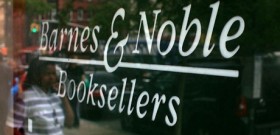Waarom Amazon Barnes en Noble moet kopen

Barnes en Noble (wie ooit iets stedelijks of een mall in de VS bezocht kan er niet omheen) is één van de grootste boekwinkels in de VS en het bedrijf, opgericht door meneren Barnes (1873) en Noble (1917) staat te koop. De beurswaarde is gehalveerd, het bedrijf voert een strijd met Apple en Amazon om meester te worden in digitaal boekenleesland (nu 20 procent marktaandeel), activistische aandeelhouders willen meer geld zien en dus worden alle mogelijkheden onderzocht. In The Land of the Free is alles te koop voor hij of zij met diepe zakken. Dat gegeven inspireerde Mike Cane om eens wat redenen op te schrijven waarom Amazon Barnes en Noble zou moeten kopen (tip van: @boezeman). Interessante gedachte, waar natuurlijk genoeg op af te dingen valt:
Cane heeft wel een paar redenen waarom het goed zou zijn als Amazon Barnes en Noble inlijft. Over het kopen van marktaandeel gesproken en over het in een keer weghappen van een concurrent. Tuurlijk is het maar de vraag of dat nu zo’n slimme zet zou zijn. Maar de gedachtengang is boeiend:
- If this doesn’t make sense, consider FedEx buying Kinko’s. This merger would be far less strange.
- Amazon would gain a huge book-related retail presence for the Kindle.
- Amazon could swiftly put ePub to death in one shot and transition all Nook buyers to Kindle format — without requiring eBook re-purchasing.
- Amazon would have the major presence in book buying and force the industry into the twenty-first century.
- Amazon could install POD machines. Barnes & Noble could finally offer what Amazon always has: every book in print, in-store. POD machines would mean cutting back on inventory by forcing publishers to eBooks and POD. (Publishers would come to favor that: finally, a business with no returns.)
- Those who live near a Barnes & Noble could pick up shipments there, instead of waiting for FedEx or UPS to arrive and without the fear of waiting packages being damaged or stolen.
- Amazon is known for pleasing customers — Barnes & Noble, not really.
- Amazon is a retail business anyway — albeit entirely online — and could use the extra real estate freed up by fewer print books to showcase items people can’t sample online. For example, how much would Kindle DX sales increase with people being able to actually hold it and try it without obligation?
- Amazon has the cash to do this in one swoop.
- A disorderly collapse of bookselling is not in Amazon’s best interests. Borders is already in trouble and publishers must be wondering what unpaid bills they’ll get stiffed with by that company.
- If, as Bezos stated on Charlie Rose, the Kindle is all about reading, this is the chance to show that in a big way.
- Any other buyer — including taking Barnes & Noble private — would be worse. One eBook file standard needs to prevail outright for the good of both publishers and readers.
- The Amazon Store as a name has better brand recognition. Worldwide. They’d become tourist stops, like the Apple Store. Per-square-foot traffic and revenue would skyrocket.
- Amazon merch. How many tourists will leave with a T-shirt? A hat? A carrying bag? A Kindle case?
- As I’ve waited to hit Publish, people on Twitter have objected to the idea based on Amazon having a retail presence invoking sales taxes. With every state being in financial distress — and the federal government too — taxes are going to happen anyway. The Internet does not exist above or separately from the countries its companies operate in (ask any of them how many subpoenas they get each day — and from whom). And Amazon, then being “caught” in the tax trap with a brick and mortar presence, can go on to argue to close that loophole for all others too. Because that’s how business operates.
In een van de comments op het blog van Publishers Weekly wordt gehakt gemaakt van bovenstaande argumenten:
“None of Cane’s reasons make sense (although #13 comes close — the Amazon store to compete with the Apple Store and, incidently, virtually every other retailer given Amazon’s product offerings). Amazon would not benefit from the buy-out as they would have to assume the debt and antiquated operations of B&M bookselling. In no small way, Amazon has benefited from putting independents out of business. It would be in their best short-term interests to stand out of the way while B&N and Borders fade into history (and not to be sucked into the demise). Why throw money at B&N — they should spend wise to better compete against Apple and Google. How would it kill ePub? Doesn’t Apple use ePub? If anything the Amazon purchase of BN would give license to killing the Kindle format and moving its approach to ePub. Finally (although I could go on), it is indeed unlikely that a buy-out would pass antitrust/Dept of Justice review. I don’t think it is anything like FedEx (a shipper) buying Kinkos (a printer).”
Concurrentie vs allianties
Het idee van Cane lijkt in eerste instantie niet eens zo gek. Maar het staat eigenlijk haaks op de manier waarop Amazon het laatste decennium business heeft gedaan. Altijd is het bedrijf op zoek geweest naar partners en medestanders om samen te profiteren. Hoewel: de overname van Zappos.com is niet genoemd door Cane en dat zou prima argument 16 kunnen zijn. Dat was immers ook een concurrent met boemveel potentie om het Amazon met een geniaal service concept moeilijk te maken.
Barnes en Noble sleept een megageschiedenis achter zich aan die prachtig is, maar ook schaduwzijden heeft. Maar als Amazon het niet doet; is dan niet ieder ander bedrijf dat B&N wél koopt niet super schadelijk voor Amazon? Erg gezond is Barnes en Noble op dit moment niet, en wat moet Amazon nu eigenlijk met zovéél bakstenen winkels? Er fanstores van maken, zoals de Apple Stores? Aldaar de Kindle experience vergroten? De Nook van Barnes en Noble zou in een keer van de kaart zijn, dat laat een heleboel gebruikers onthutst achter. En zo kunnen we doorgaan….
2 Reacties
Plaats reactie
Je moet ingelogd zijn op om een reactie te plaatsen.

Allereerst dank voor de credits!
Ik kwam dit bericht gisteren tegen nadat ik eerder al een blogpost had geschreven over de strategie die Amazon lijkt uit te voeren (en die redelijk parallel lijkt te zijn aan die van Apple). Kindle is geen e-reader, Kindle staat gelijk aan elektronisch lezen. Dus is ook: de online winkel, de e-books en misschien ook wel fysieke winkels. In dat opzicht is de blogpost van Cane ook helemaal geen vreemde. Nee, niet elk van zijn argumenten is even sterk, maar allen bevatten ze best potentie. Het gehaktmakende tegenbericht wat ook hier gequote wordt is dan ook helemaal niet sterk en is zelfs zwakker qua onderbouwing dan elk van de vijftien punten die Cane oorsponkelijk aandraagt.
Het roept in ieder geval genoeg discussie op, en dat is mooi!